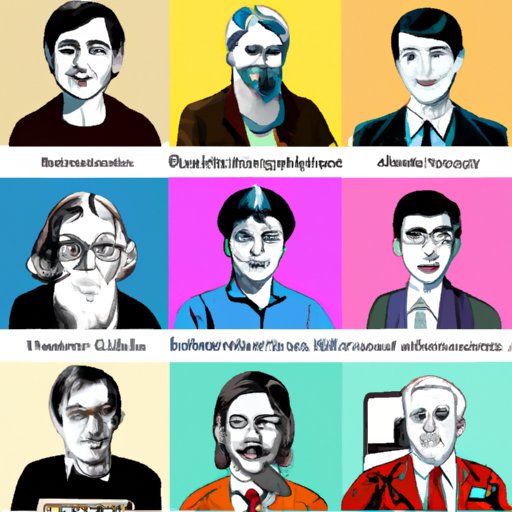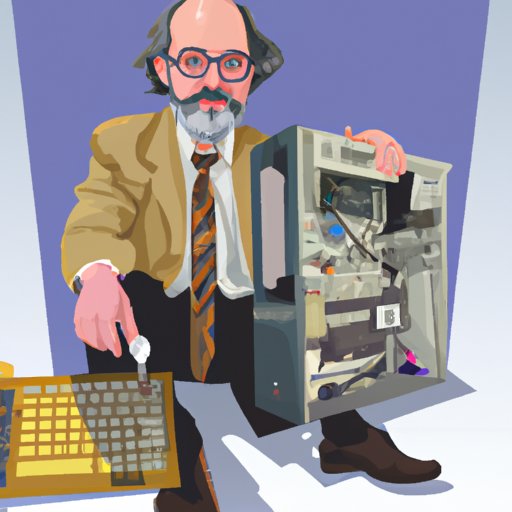Introduction
The computer is one of the most influential inventions of modern technology. It has revolutionized our lives in countless ways, from communication to entertainment to education. But who invented the computer? While there is no single inventor credited with creating the computer, there are a number of individuals who played a part in its development and evolution.
To understand the invention of the computer, it’s important to start with a basic definition. A computer is an electronic device that takes input, processes it, stores it, and produces output. It can be used for a variety of tasks, from word processing to gaming to data analysis.

A Brief History of the Inventors Behind the Computer
Exploring the Pioneers Who Built the First Computers
The history of the computer stretches back centuries, and many of the earliest machines were mechanical in nature. The first known example of a computing machine was the Antikythera mechanism, which was discovered in Greece in 1902. This device dates back to the first century BC and was used to calculate the position of stars and planets. It was powered by a hand crank and featured intricate gears and dials.
In the 19th century, Charles Babbage designed a series of mechanical computing devices. He is often credited as the “father of the computer” due to his efforts to create a fully automated, programmable machine. However, his designs were never realized during his lifetime.
Tracing the Steps: How the Computer Was Invented
The invention of the computer as we know it today can be traced back to John Atanasoff and Clifford Berry. In 1937, they designed and built the Atanasoff-Berry Computer (ABC), which was the first electronic digital computer. This machine was capable of solving linear equations, making it a major breakthrough in computing.
Konrad Zuse also had a major impact on the development of the computer. In 1941, he created the Z3, which was the first programmable, fully automatic computer. This machine used binary code and punch cards to operate, and it was a significant step forward in the development of computing technology.
Alan Turing is another important figure in the history of computers. In 1936, he published a paper describing the concept of a universal computing machine. This paper laid the groundwork for modern computer science and provided insight into the possibilities of computers.

The Innovators Who Revolutionized Computing
Charles Babbage is widely regarded as the father of computing. His early designs laid the foundation for the development of the modern computer. He envisioned a machine that could calculate and store data, automate processes, and even make decisions based on input.
John Atanasoff and Clifford Berry are credited with designing and building the first electronic digital computer. Their work laid the groundwork for future generations of computers and ushered in a new era of computing.
Konrad Zuse is credited with creating the first programmable, fully automatic computer. His work helped to advance the field of computing and paved the way for the development of modern computers.
Alan Turing is considered one of the most influential figures in computing. His seminal paper laid the groundwork for modern computer science and opened up new possibilities for computers.

Meet the People Behind the Invention of the Computer
John Mauchly and J. Presper Eckert are credited with building the first large-scale, general-purpose computer. Their machine, the ENIAC, was completed in 1946 and was capable of performing complex calculations. This machine was the first of its kind and set the stage for future generations of computers.
William Shockley, John Bardeen, and Walter Brattain are credited with inventing the transistor. This small electronic component revolutionized computing by allowing for more powerful and efficient computers. Without the transistor, computers would not have been able to become as small and powerful as they are today.
Steve Wozniak and Steve Jobs are credited with developing the first personal computer. Their machine, the Apple I, was released in 1976 and revolutionized the way people used computers. It was the first computer designed for home use, and it paved the way for the modern personal computer.
Computer Inventors: An Exploration of Their Work and Impact
The inventors behind the computer have had a profound impact on the world. Their work has revolutionized the way we communicate, work, and entertain ourselves. From the Antikythera mechanism to the Apple I, these pioneers have changed the course of history.
How Their Inventions Changed the World
The invention of the computer has had a huge impact on the world. It has revolutionized the way we do business, communicate, and even think. Without the contributions of these pioneers, the world would be a much different place.
What We Can Learn from These Pioneers
The inventors behind the computer have left us with a valuable legacy. They have taught us that anything is possible if we put our minds to it. Their work has inspired generations of innovators and inventors to push the boundaries of technology.
Conclusion
The invention of the computer is one of the most influential events in history. It has revolutionized the way we live, work, and think. While there is no single inventor credited with creating the computer, there are a number of individuals who have contributed to its development and evolution.
This article explored the inventors behind the computer and how their inventions changed the world. It looked at the pioneers who built the first computers, those who revolutionized computing, and the people behind the invention of the computer. We can learn a great deal from these pioneers, and their work will continue to inspire future generations of innovators.
(Note: Is this article not meeting your expectations? Do you have knowledge or insights to share? Unlock new opportunities and expand your reach by joining our authors team. Click Registration to join us and share your expertise with our readers.)
